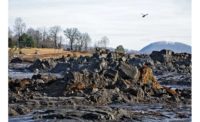A 34-page U.S. Army Corps of Engineers decision has stopped movement on a proposed coal export terminal at Cherry Point in northwestern Washington.
The $700-million project, which would have created three ship berths and a new vessel-approach lane, with a wharf and trestle stretching over 122 acres of water in one of the West Coast’s deepest natural ports, ran into opposition from environmental groups across western Washington and the Lummi Nation tribe.
Gateway Pacific Terminal—proposed by Pacific International Terminals LLC, a joint venture between SSA Marine and Cloud Peak Energy—had support from government officials, tribes and businesses in Montana and Wyoming as a prospective shipping terminal to send coal from the mountain states to customers in Asia.
But Seattle District Commander Col. John Buck determined the potential impacts to the Lummi Nation’s fishing rights trump the proposed terminal. “Because the district has determined the effects to the Lummis’ rights are more than de minimis and because the Lummi maintain their objections to this proposal,” states a Corps release, “the project cannot be permitted by the Corps.”
The Lummi claimed its 1855-signed Treaty of Point Elliott rights would be violated if the terminal went forward.
“Our concern is to protect the area,” says Lummi Nation Chairman Tim Ballew. “The interests that the tribe have range from the cultural properties and the sacred site at Cherry Point, knowing that it’s a village site … and a reef-net site.”
Retired Col. John Eisenhauer, a former Corps commander in Portland and now a senior adviser for Dawson & Associates, Washington, D.C., writes that the “de minimis” language is the key decider in these types of projects. “Once the Corps determined a greater than de minimis impact to Lummi treaty rights, the Corps had no choice but to reject the proposal, in keeping with Article 6 of the U.S. Constitution,” Eisenhauer notes.
In effect, the Corps’ action kills the project, stopping work on the environmental impact statement and the National Environmental Policy Act process.





Post a comment to this article
Report Abusive Comment